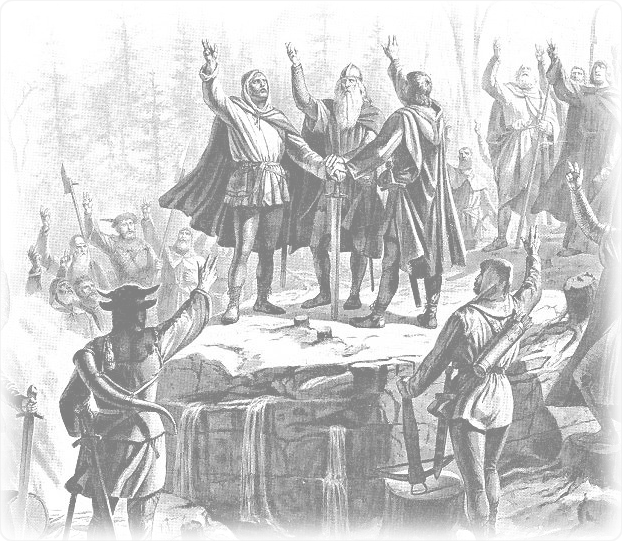Treasure hunters & Prospector code of honour
Germany is a small country with many people interested in history. Cooperation between the countless volunteers involved in the preservation of historical monuments and the representatives of the monument authorities is of the utmost importance, even if it is not yet easy to realise everywhere. In some places, hardliners on both sides still prevent fruitful co-operation in the interests of the historically interested German public and press reports about incorrigible treasure hunters "robber diggers" lead to a completely false public image of explorers in general.

Every archaeologist seriously interested in German prehistory and prospector with a Metalldetektoren should be aware that trusting cooperation in Germany is the only way to success. There are more and more examples of great joint successes in the federal states, which specifically train and deploy metal detectorists for prospections. In recent times, for example, trained explorers and volunteer archaeologists have made sensational treasure finds with Metalldetektoren WITHOUT destroying important information for the archaeologists due to improper excavation.
Many federal states, or their state offices for the preservation of historical monuments, now offer theory and practical seminars for people using their Metalldetektoren, or are no longer completely closed to the possibility of co-operation with the help of treasure hunters. These include, for example, North Rhine-Westphalia, Baden Württemberg, Hesse, Mecklenburg-Western Pomerania, Lower Saxony and Schleswig Holstein. The possibility of cooperation is in demand throughout Germany; anarchistic explorers and archaeologists who still refuse to cooperate, even though recent successes with Metalldetektoren speak for themselves, should be a thing of the past. Well-trained explorers with their metal probes are a real opportunity for archaeology!
Dear prospector!
- Try to build up a co-operative relationship with your heritage conservation office and don't believe everything the so-called "old hands" tell you. Because sometimes you'll find yourself walking through open doors. If your research permit is rejected, try again or seek dialogue and perhaps agree on a compromise. Attend the seminars offered for explorers in your federal state and use your Metalldetektoren responsibly.
- Try to discover new areas with your metal detector instead of searching at cultural monuments! In any case, avoid the current excavation protection areas and current archaeological excavations with your Metalldetektoren. Do NOT search with your metal detector on undisturbed ground (e.g. in nature reserves) without the express permission of the monument preservation authorities. When digging there, you may irreparably destroy important archaeological features
- Do not simply search with your Metalldetektoren in areas that you should know are already being used by other explorers and treasure hunters with their metal probes, instead ask if you can search there together with them.
- Always measure archaeologically relevant finds that you have made with your Metalldetektoren with a GPS device or a smartphone GPS app and report the finds with a picture and GPS data to your local archaeologists at short notice, if not otherwise possible by an anonymous "one-time email". Pay attention not only to metal finds, but also to pottery and stone artefacts on the surface.
- Be aware that every intervention in the German soil archive removes a piece of the puzzle of our common history, which must be documented, researched and preserved for the general public. Do not sell any finds, rather donate them to a museum and thus to the general public interested in history!
- Ask for permission if you want to search on private property with your Metalldetektoren. Experience has shown that the landowners usually don't mind and will even help with the treasure hunt (...). You often find out interesting things this way.
- Search with your metal probe in an environmentally conscious way. Always take a rubbish bag with you on your treasure hunt. Collect the rubbish you find and dispose of it in a public rubbish bin at the end, or take the scrap to a recycling centre and maybe even earn a few euros.
- Fill in dug holes. This should be a matter of course, so you don't spoil the landscape with ugly holes and can come back with your metal probe and a clear conscience. Open holes are deadly traps for small creatures and even red deer can break their legs, leading to a certain and agonising death.
- Avoid sown fields and plantations with your Metalldetektoren at all costs.
- Always remain friendly when you are approached while treasure hunting with your Metalldetektoren. Remain friendly even if people are not favourably disposed towards you. Ignore whistleblowers if you yourself are in the right.
- Be honest when searching with others. Show every find and don't hide anything from your partner. Be a good friend.
- Do not give false information about places you have found. As a rule, an experienced archaeologist can easily check the stated find location on the basis of the find patina, soil remains and the find itself. Do not try to disguise a find site, i.e. give a false find site where you have found an archaeological artefact. The heritage protection authorities know exactly where certain artefacts can and cannot be found. If such concealment is discovered, you will lose your reputation with the authorities and you will not receive an extension to your Metalldetektoren research licence.
- Report ammunition finds to the police or the explosive ordnance disposal service. Never dig up ammunition and leave it on the surface. Children playing or passers-by could come to harm! Avoid any impacts and shocks to ammunition and unexploded ordnance. Do not put yourself in danger, mark the site, keep your distance from the marked location and report it to the police immediately.


